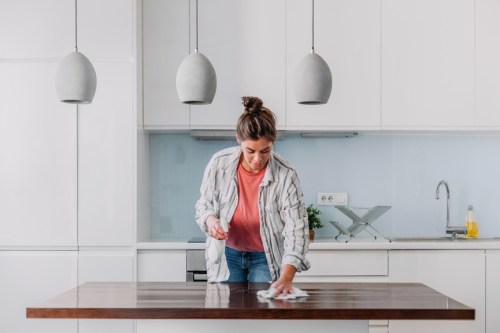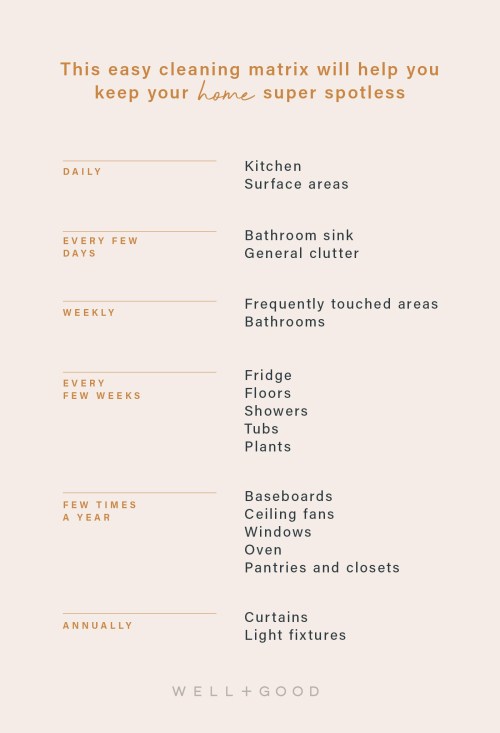This matrix explains *exactly* how often you should clean your house from top to bottom
How often should you clean your house? To keep your space sparkling, cleaning experts explain what to clean daily, weekly, monthly, and yearly

The people with the tidiest homes always say the same thing—to keep your space sparkling, you have to clean regularly. If you wait and let the dirt and grime pile up, what could have been a few minutes of daily cleaning is now a seven-hour event. But, that doesn’t mean scrubbing the toilet and dusting your shelves needs to happen every day. Angela Bell and Gloria Dixon, grove guides at Grove Collaborative, say that certain areas require less frequent attention.
Experts in This Article
cleaning expert at Grove Collaborative
former grove guide at Grove Collaborative
To help you figure out what to clean and when, here’s how often should you clean your house.
How often you should clean your house, according to experts

1. Daily
Kitchen
“If you are prepping food and cooking regularly keeping the kitchen clean daily is a must. Keep on top of dishes, wash counters, and sweep and spot-mop any spills when cooking is done for the day,” says Bell.
Surface areas:
“Dining room tables, breakfast nooks, or coffee tables—if food is consumed there, wipe it down to discourage bacteria growth and pests, and sweep any crumbs that have fallen onto the floor below,” says Bell. “Picking up clutter can go a long way in making a home feel tidy. Do a daily tidy of tables, counters, and any surface that tends to collect mail, books, or personal belongings. Collect any toys that have gathered around the house. Fold throw blankets and make beds to start fresh for the day.”
2. Every few days
Bathroom Sink
“This area gets a lot of action, from washing hands and brushing teeth to using makeup and hair products, which is why it benefits from a semi-weekly wipe down,” says Dixon. “Stash disinfecting wipes in your bathroom for quick and easy sink cleanup. Wiping down the sink, faucet, and handles will remove germs and bacteria while making this frequented area shine.”
General clutter
“Set a 10-minute timer on your phone to tackle anywhere that shoes or clothes collect: entryways, bureau tops, or clothes chairs—we all have that clothes chair in the bedroom,” she says. “You’ll be amazed how quickly these spaces can be tidied up, and by giving them a little attention every few days, you’ll keep clutter to a minimum.”
3. Weekly
Frequently touched areas
Think spots like light switches, door handles, TV remotes, and game console controls. “A quick wipe down once a week can keep germs at bay,” says Dixon.
Bathrooms
“Bathrooms are an area that should be cleaned weekly,” says Bell. “Many germs and bacteria are introduced to your bathroom on a daily basis, and because bathrooms are typically exposed to a higher moisture content there is an opportunity for mold and mildew to thrive. Clean mirrors, toilets, and sinks, wipe down tubs or showers, and launder any used towels and bath mats. Empty out wastebaskets and sweep floors.”
4. Every few weeks
Fridge
“It’s important to address the fridge every couple of weeks to remove expired or spoiled food, wipe down shelves and drawers, and plan a meal with those foods that are nearing their end,” says Dixon. “Regular cleaning of your fridge will keep it smelling fresh, and eliminate any mold growth on older food items.”
Floors
Aside from regular spot cleaning, Dixon says you should do a thorough cleaning of your floors every few weeks,
“Clean and mop floors, paying extra attention to entryways and high-traffic areas,” she says. “A semi-monthly mop is a great way to pull up pollen, pet dander, and dust that accumulate on the floor. These small particles will find their way onto other surfaces if they aren’t regularly cleaned, so give your floors love on a regular basis.”
Shower/tub
Though you should aim to clean your bathroom weekly, Dixon says that every few weeks you should pay your shower and-or tub some extra attention.
“Deep clean your shower or tub area, washing shower liners and focusing on any grout and tile,” she says. “Bathrooms are prone to gathering moisture, and regular cleaning of the tub and shower keep mold and bacteria from thriving in the moist environment. This also keeps minerals in your water from building up on grout, tile, and shower curtains.”
Plants
“Plants with wide, flat leaves will tend to collect dust just like anything else,” says Dixon. “Cleaning dust away helps with transpiration so your plants stay healthy. Once a month, use a damp rag to wipe down leaves—while you’re at it, wipe down plant pots for dust or soil.”
5. A few times a year
Baseboards, ceiling fans, and windows
“These are all staple features in your home that should be treated to a good cleaning two to three times a year,” says Bell. “Whether it’s dust, pet hair, pollen, or just dirt collecting on these surfaces, a maintenance cleaning several times a year will keep build-up at bay.”
Pantries and closets
“Get rid of expired food in pantries. Donate unwanted clothes from the closet,” says Bell. “This is a great way to take stock of what you have before going into a new season.”
Oven
“Oven cleaning is a great task to tackle seasonally,” says Bell. “Clean out any hood vents if you have them, and wipe down walls around the stove and oven area that may have accumulated grease.”
Here’s Grove’s guide to cleaning your oven overnight:
6. Annually
Curtains
“Curtains are a great item to throw on your annual spring cleaning list,” says Dixon. “Dust can accumulate on curtain fabric over time, and laundering during spring cleaning will brighten them up. Coordinate curtain cleaning with a semi-annual window cleaning for maximum results! For curtains that are exposed to more than just normal “household dust,” like in a bathroom or next to a cooking area, wash as needed to remove mildew, food spatter, etc.”
Light fixtures
“Light fixtures are often forgotten, and over the course of time can collect dust and cobwebs,” says Dixon. “An annual cleaning can do wonders for bringing life back into your lights! Use a long-handled duster to wipe down fixtures, and take this time to replace any blown bulbs. While you are up there, take this time to test and dust smoke detectors and replace batteries.”
Sign Up for Our Daily Newsletter
Get all the latest in wellness, trends, food, fitness, beauty, and more delivered right to your inbox.
Got it, you've been added to our email list.









